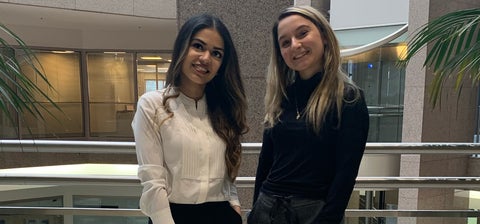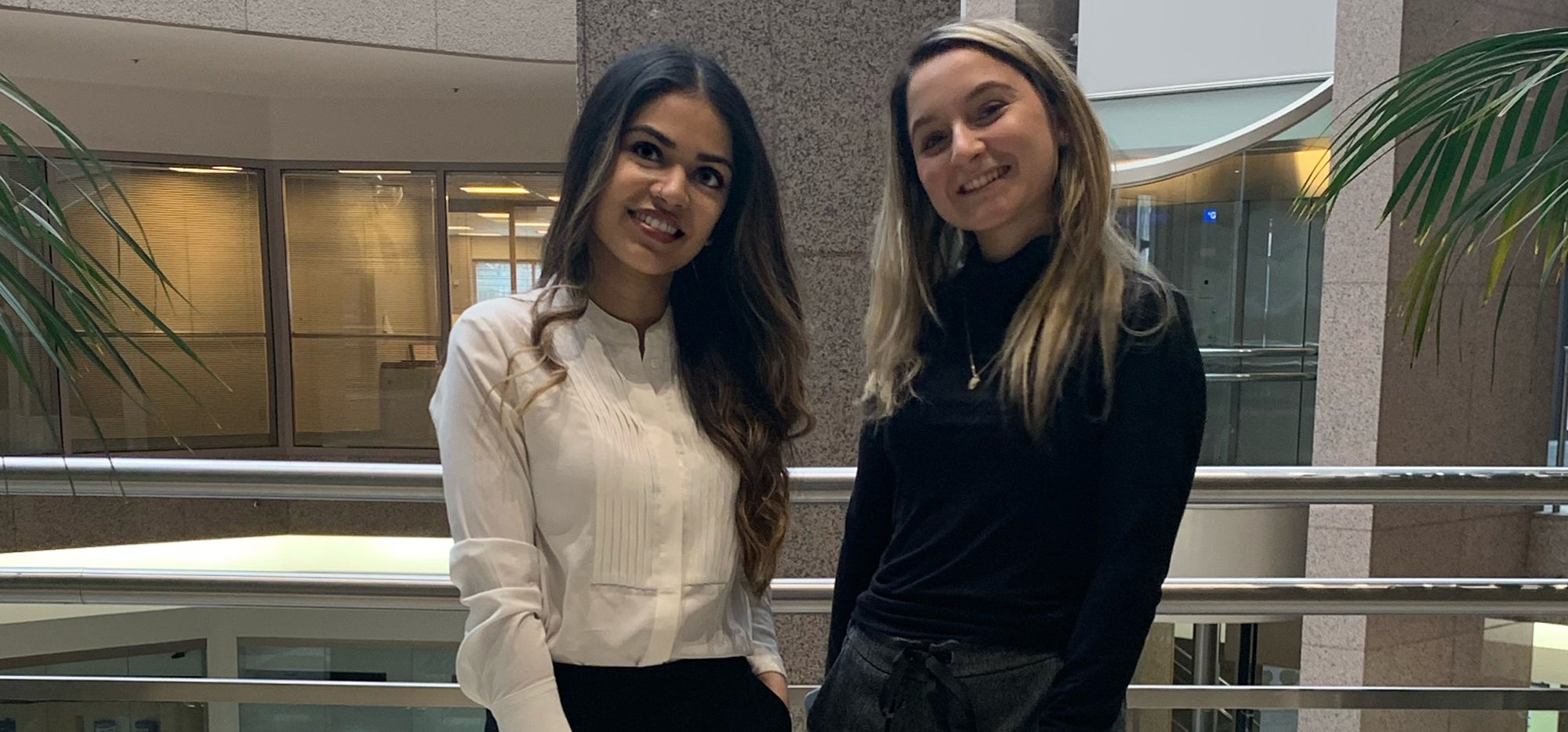
Ensuring drug access for Ontarians during COVID-19

Nikita Mahajan and Ezgi Ulkuseven standing in the lobby of the building where they worked on co-op. Nikita and Ezgi were on co-op at the Ministry of Health when COVID-19 struck in Canada.
Nikita Mahajan, a second-year pharmacy student, knows the ins and outs of drug insurance claims. In a previous job at a biologics pharmacy, she was the one responsible for completing drug authorization forms and coordinating with patients and physicians to get the information needed to make a request for drug coverage to an insurance company.
In January, she put herself on the other side of that exchange. She started a co-op term with the Ministry of Health (MOH), joining a team that clinically assesses individual requests to provide public drug coverage for eligible patients across Ontario.
“I’ve always been interested in the public versus private system in Canadian health care,” Nikita says. “I’d been on the side of people making the claims for coverage. I wanted to see what it was like across the table, in the assessor role.”
Nikita was one of several Waterloo Pharmacy co-op students supporting the Exceptional Access Program (EAP) at the MOH office in North York. EAP facilitates access to government-funded coverage for medications not covered through the Ontario Drug Benefit (ODB) formulary that are generally at a higher risk for inappropriate utilization due to costs or safety concerns and where formulary funded alternatives may be a more cost-effective initial choice. EAP funded drugs are also considered part of the ODB program and an individual must be eligible to receive ODB benefits and meet specified criteria to access one of the 1,000 drugs listed under EAP.
On the team, Nikita took calls from physicians or physician delegates to determine if the patient’s clinical scenario would meet EAP’s pre-determined objective criteria in order to provide coverage for the requested medication. These criteria are set forth by a rigorous assessment involving national committees and drug review processes that assess the clinical evidence, economic impact, and patient perspective. There is a great deal that goes on behind the scenes in order to get a medication covered by the provincial or territorial plans.
“These were intimidating calls at first,” Nikita reflects. “I never had the opportunity to work closely with physicians, and having to make decisions in real time, consult resources, and think critically pushed me to be an efficient problem-solver.”
Nikita and the other students had rigorous training to evaluate requests. Since the work involves a robust understanding of medications, Nikita leaned on her mentors on the team for support.
“It was so disheartening when you have to deny a claim and say no to people,” she remembers. “The first few times I’d happen, I would go to my trainer and see if there really was nothing else we could do. But the decisions are based on criteria that have been approved through an established process based on information received by the Ministry at the time that provincial funding was requested by the manufacturer. The review of evidence and cost-effectiveness results in the “recipe” for funding and the EAP processes is to apply the requirements consistently to ensure the most equitable access as possible.
As the COVID-19 pandemic unfolded across Canada, the students worked hard to support the EAP team on assessing requests. The medications covered by EAP are often specialized and given the other impacts COVID-19 had on the health-care system – virtual appointments, closed offices, delayed surgeries – it was important that patients would have uninterrupted access.
Disha Shah, Nikita’s co-op preceptor and Waterloo School of Pharmacy alumni from the class of 2013, understands the value of the EAP, particularly in challenging times. Working from home over a secure connection, Disha and her colleagues continue to evaluate requests and take phone calls from physicians and patients all over Ontario. The EAP team also assesses urgent drug requests coming in for patients imminently waiting hospital discharge and need medications that are accessible through the EAP.
Taking the calls and assessing these requests requires Disha to keep up to date on evidence and clinical guidelines so that she can evaluate the necessity of drugs and the possibility of alternative medications.
Through my time at EAP, I consider myself lucky to have gained an in-depth knowledge about the use of drugs in a variety of conditions I wouldn’t otherwise be exposed to. Conditions such as hepatitis, giant cell arteritis, multiple sclerosis, oncology, and inflammatory bowel conditions are just a few examples.
The shift to a work from home model required the EAP team to quickly adapt technologies that would ensure confidentiality and efficient collaboration.
“In particular, we’ve worked with our colleagues in Public Drug Programs to do our best to make sure patients are receiving timely and appropriate responses. We’ve had to temporary modify some criteria to reflect the reality that specialized services like pulmonary function testing or surgery may be unavailable during COVID-19.”
Sometimes, the ‘new normal’, requires a change to a patient’s medication.
“For example, some oral cancer drugs are being recommended as an alternative to intravenous ones so that patients can stay home instead of travelling to the hospital for injectable drugs.”
Disha and her colleagues continue to work hard to ensure eligible Ontarians can access their medications. The team spirit, even when working remotely, stays strong, and it’s something that Nikita appreciated over her co-op term.
What really stood out to me was the value of teamwork at the Ministry. You see this group of hardworking individuals collaborating to ensure clinically appropriate and objective funding decisions are made. People go over to each other’s desks and bounce ideas back and forth, learning from each other. I can only hope my future workplace is so collaborative.